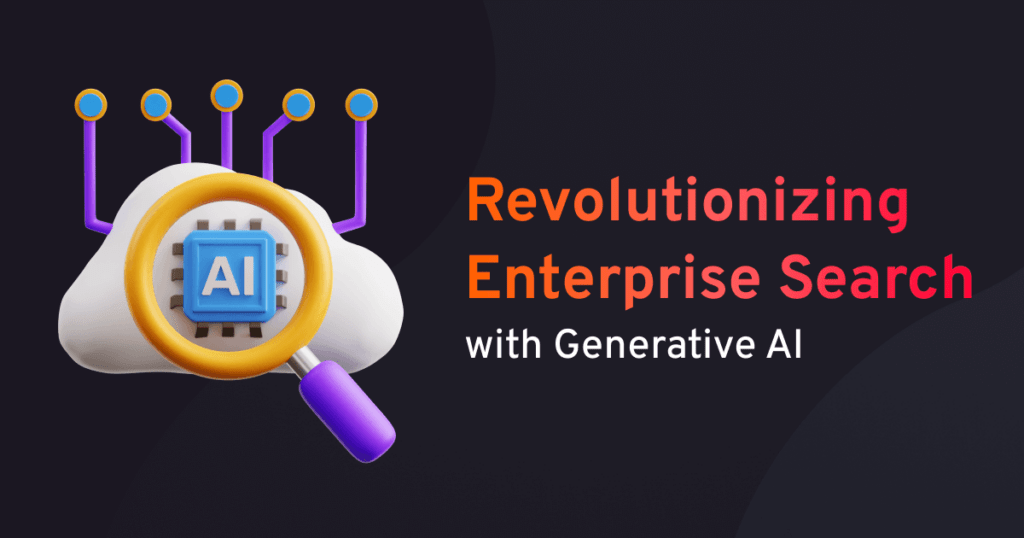How Generative AI is Redefining Enterprise Search: Embracing the Future
In the age of vast digital information, enterprise search systems have transitioned from a mere convenience to a critical component in the functioning of businesses. The ability to swiftly locate and utilize data across a sprawling digital ecosystem has become a defining factor for operational efficiency and competitive advantage.
However, as we advance further into the digital age, enterprises encounter new challenges and limitations with traditional search technologies. Enter Generative AI: a transformative force for enterprise search solutions.

Table of Contents
- An Intro to Generative AI for Enterprise Search
- Why Does Enterprise Search Matter?
- Limitations of Traditional Enterprise Search
- Enterprise AI Search with Generative AI
- Unique Industry-specific Understanding
- Contextual Search Continuity
- Answer Generation from Single/Multiple documents
- Precision-Gated Search Functionality
- Multi-Language Support
- Access Control List & Regional-Boundaries Support
- Streamlined and Personalized Search UX
- Conclusion
- Additional Resources
Enterprise Search: Why Does It Matter?
Enterprise search serves as the backbone for businesses to unlock the wealth of knowledge hidden within their digital repositories. It allows employees to access valuable information from various sources including emails, documents, internal databases, CRMs, and more.
An efficient search mechanism saves time and enhances productivity by reducing the cognitive load on employees as they sift through expansive datasets to find the precise information they need.

Limitations of Current Enterprise Search
Traditional enterprise search platforms are often limited by their semantic algorithms and index-based search methodologies. They may struggle to comprehend the context behind a user search inquiry, which leads to a plethora of issues such as:
- Inability to understand natural language queries, especially when convoluted and verbose.
- No capability to maintain contextual continuity for query elaboration.
- Difficulty in handling synonyms and industry-specific jargon.
- Minimal customization and personalization options.
- Inadequate multi-language support.
- Lack of adaptive access control based on user roles.
In response to these challenges, the concept of Search as a Service has emerged as a pivotal solution for businesses. This model utilizes cloud computing and artificial intelligence to provide tailored search capabilities, allowing enterprises to innovate and manage their information resources efficiently.
By swiftly addressing customer and employee inquiries with relevant answers, Search as a Service for enterprises enhances the overall search experience and operational efficiency.
The Advent of Enterprise AI Search with Generative AI
Enterprise Search solutions powered up with Generative AI (Also, known as Enterprise AI Search), have been game-changers in this domain. Leveraging Generative AI at a scale not seen before, these systems have started to address many of the previous limitations.
Unique Industry-specific Understanding with LLM Grounding and Fine-Tuning
When it comes to synonyms, AI terms, reasoning, and jargon unique to various domains, traditional search technologies could often stumble, necessitating verbose metadata and manual tagging to ensure relevant results. However, Enterprise AI Search systems with neural search capabilities can be enriched and adapted to the linguistic nuances of a given industry/customer with LLM evaluation, grounding AI, and LLM fine-tuning (light model weights adaptation).
As a result, Enterprise AI Search systems can contextually discern and associate industry-specific synonyms, decode intricate jargon, and grasp underlying domain-specific reasoning without the need for explicit human direction or reformulation. Consider a scenario where a financial analyst is searching for insight on “quantitative easing” (QE).
A Generative AI-driven Enterprise Search tool will understand that “expansionary monetary policy”, “large-scale asset purchases”, and “QE” all converge under the same umbrella of economic strategies. It can thus gather comprehensive data for the analyst across a wide array of documents – from central bank reports to market analyses – each using different terminologies but discussing the same concept.
Such a system could even interpret company reporting shorthand, equating “LTV” with “Loan to Value” or “D/E” with “Debt-to-Equity ratio,” streamlining research tasks in finance by interpreting industry jargon and presenting the user with a cohesive, reasoned set of information resources.
Contextual Search Continuity
In traditional search, each user search query is treated as an isolated event with no inherent relationship to previous user queries. This often leads to redundant interactions or irrelevant information retrieved.
Enterprise AI Search, however, keeps track of the context and history of the user’s search queries within a search session, allowing for follow-up questions that build on earlier results, much like an ongoing conversation with an AI virtual assistant.
To exemplify this, let’s consider a user who begins a session with a query about a company policy on remote work. The Enterprise AI search not only retrieves the relevant document but also understands and maintains the context of the query.
If the user, then asks a follow-up question like “How does this policy apply to international employees?” The system recognizes that “this” refers to the remote work policy and that the user is seeking specific information about the applicability of the remote work policy for international employees.
Answer Generation from Single/Multiple documents
Enterprise AI Search goes beyond document retrieval, which can be described as “cognitive” search experiences. Historical search technologies would locate and return a list of documents, leaving the user with the task of combing through the results to find the information they needed. Enterprise AI Search, however, has moved the technology forward to a more intelligent and intuitive stage.
Instead of merely returning documents, the AI contextualizes the inquiry with historical information, searches for relevant information across all indexed data sources, analyzes and understands the content found within documents relevant to the query, and distills the essence to generate a direct and coherent answer. This synthesis may involve summarizing a single document or integrating insights from multiple documents.
Precision-Gated Search Functionality
Domain-restricted search capability is a critical feature in Enterprise AI search that allows businesses to curate their information pool with a high level of precision and security. Unlike unrestricted search systems which can pull in content from any source – often yielding an excess of irrelevant or untrusted information – domain-restricted search lets organizations confine the search scope to a whitelist of approved sources.
This guarantees that the information retrieved is not only relevant but also complies with company policies and security standards. This capability is especially useful for organizations that rely on both their internal knowledge bases and specific, trusted external sources.
For example, a company might allow search queries to be answered from internal corporate documents as well as from external reputable industry publications, legal databases, or official technical support websites of product vendors.
Multi-Language Support
Multi-language support within Enterprise AI Search is one of the most significant strides toward creating a truly global use of AI in the workplace. The ability to support multiple languages is not merely about translating words from one language to another but about comprehending and responding to queries with their linguistic nuances intact.
This is achieved through the integration of advanced translation services and large language models that have been trained across a diverse and vast corpus of multilingual data. Generative AI can understand the intent and meaning behind search queries in one language and find the relevant information in documents that may be written in completely different languages.
Access Control List (ACL) & Regional-Boundaries Support
Equally important in enterprise settings is the implementation of robust access control mechanisms. When a Generative AI-powered search system is configured with ACLs, it considers the hierarchical structures within an enterprise, granting or restricting access to information based on an individual’s role, department, or clearance level.
This nuanced approach to data permissions ensures that sensitive documents or confidential insights are only available to authorized personnel, thereby mitigating the risk of internal data breaches, and maintaining operational integrity. Furthermore, as enterprises stretch across regional borders, the need to respect data sovereignty and language preferences becomes paramount. Regional support through Enterprise AI Search implies that the technology is cognizant of the geographic contexts, deploying region-specific configurations.
The combination of ACL and regional support through Generative AI stands as a testament to the sophisticated, secure, and globally aware search solutions that are indispensable for modern enterprises navigating the complexities of information governance and multinational presence.
Streamlined and Personalized Search UX
Generative AI leverages user-profiles and search history to deliver personalized answers. Generative AI models are continuously trained on user interactions with the search system to uncover patterns in user search behavior.
As these models ingest more data over time, they become increasingly adept at predicting which results will be most relevant to the user based on their historical interactions.
Furthermore, Generative AI learns not just from what users find relevant but also from what they overlook.
This negative feedback is just as crucial as positive signals in adjusting the user profile and preference profile for enhanced relevance. In essence, Enterprise AI Search is a living system that grows and adapts to each user’s requirements over time.
Conclusions
In conclusion, Generative AI is revolutionizing enterprise search by overcoming the challenges previously faced by traditional search systems. Its capabilities to provide multi-language support, generate precise answers from multiple knowledge articles, personalized search experiences, and inherently understand nuanced queries dramatically improve operational efficiency and decision-making processes. With the integration of strict access control layers and domain-restricted search options, it also ensures security and compliance tailored to each enterprise’s specific needs.
Enterprise AI Search is not just an improvement but a transformative tool, cementing its status as a killer application by enabling businesses of all sizes to navigate the vast and varied digital information landscape effortlessly and securely. Book a custom AI demo and explore Aisera’s Enterprise AI Search for your organization today!
